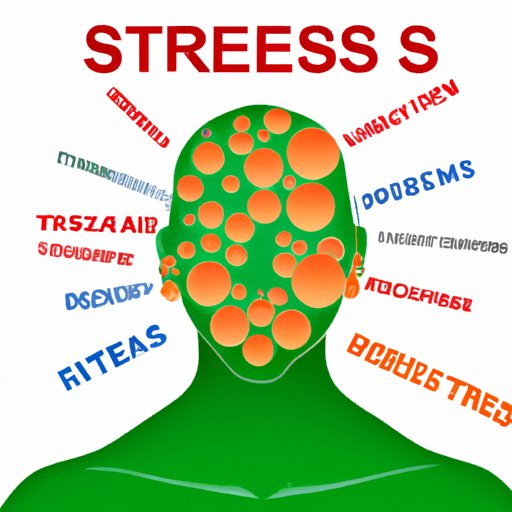
Introduction
Hives are characterized by raised, red welts that can appear anywhere on the body. They can be caused by various factors, including allergies, infections, and stress. While hives are typically not a cause for concern, they can be uncomfortable and unsightly, leading many people to wonder about the underlying causes.
Stress is a common trigger for many different health issues, including skin problems. In this article, we will explore the link between stress and hives, including how stress affects the body, why it leads to hives, and what you can do to manage your symptoms.
Stress and Skin Issues
Stress is a natural response to perceived threats or challenges in our environment, leading to increased heart rate, blood pressure, and breathing. While this response is useful in short-term situations, chronic stress can be harmful to our physical and mental health, including our skin.
When stress levels rise, the body releases cortisol, a hormone that can lead to inflammation throughout the body. This inflammation can cause or exacerbate skin issues such as acne, eczema, and psoriasis. In addition, stress can also lead to increased oil production in the skin, leading to clogged pores and breakouts.
One of the most commonly reported skin issues related to stress is hives. While the precise mechanism by which stress triggers hives is not yet fully understood, studies have consistently shown a link between the two.
The Link Between Stress and Hives: Exploring the Science Behind the Phenomenon
To understand how stress leads to hives, it is helpful to first explore the body’s stress response. When we experience stress, the hypothalamus in our brain sends signals to the pituitary gland, triggering the release of a hormone called adrenocorticotropic hormone (ACTH). ACTH then travels through the bloodstream to the adrenal glands, which respond by releasing cortisol.
Cortisol is known to increase the release of histamine, a chemical that is involved in the body’s immune response. In people with hives, the body may become overly sensitive to histamine, leading to the characteristic rash and itching associated with the condition.
While the precise link between stress and hives is not yet fully understood, several studies have provided evidence of a connection. One study published in the Journal of Allergy and Clinical Immunology found that patients with chronic hives were more likely to report experiencing stress and anxiety than those without hives. Another study published in the International Journal of Dermatology found that stress was a triggering factor for hives in up to 90% of cases.
From Anxiety to Hives: How Stress Can Affect Your Skin
As mentioned earlier, stress can lead to a variety of skin issues, including hives. While anyone can experience stress-induced hives, some people may be more prone to this condition than others.
Types of stress that can lead to hives include emotional stress, physical stress (such as injury or illness), and environmental stress (such as exposure to extreme temperatures or pollution). People who already have a weakened immune system or a history of allergic reactions may also be more susceptible to stress-related skin issues.
The Role of Stress in Causing Hives: A Comprehensive Guide
If you are prone to stress-induced hives, there are several steps you can take to manage your symptoms and reduce your risk of flare-ups.
First, it is important to identify the factors or situations that trigger stress for you. Common stressors include work-related stress, financial stress, relationship stress, and health issues.
To effectively manage your stress, it is also important to develop coping strategies. These may include relaxation techniques such as deep breathing or visualization, physical activity, social support, and practicing mindfulness or meditation.
In addition to managing stress, there are also several preventative measures you can take to help reduce your risk of developing hives. These include avoiding known triggers such as certain foods or medications, wearing loose-fitting clothing, and maintaining good hygiene practices.
Hives and Stress: Tips for Managing Both to Improve Your Quality of Life
If you are experiencing hives or other stress-related skin issues, there are several treatment options available. These may include over-the-counter antihistamines or corticosteroids, as well as prescription medications or immunotherapy in more severe cases.
Home remedies such as oatmeal baths, cool compresses, and avoiding hot showers or baths can also provide relief from itching and discomfort.
Other strategies for managing stress and hives may include behavioral therapies such as cognitive-behavioral therapy (CBT), stress management courses, or counseling. Relaxation techniques such as yoga or progressive muscle relaxation may also be helpful.
In addition to these individual strategies, it is also important to develop a comprehensive plan for managing both stress and hives. This may involve working with a healthcare provider, building a support network, and integrating various stress-reducing practices into your daily routine.
Conclusion
In conclusion, while the link between stress and hives is still being studied, there is strong evidence to suggest that stress can trigger or exacerbate this condition. By understanding the science behind this phenomenon as well as the various factors that can lead to stress and hives, individuals can better manage their symptoms and improve their overall quality of life.
If you are struggling with hives or other stress-related skin issues, it is important to seek professional help. Healthcare providers can help identify the root causes of your symptoms and provide tailored treatment options. In addition, practicing self-care and stress management techniques can go a long way in reducing your risk of flare-ups and improving your overall well-being.





